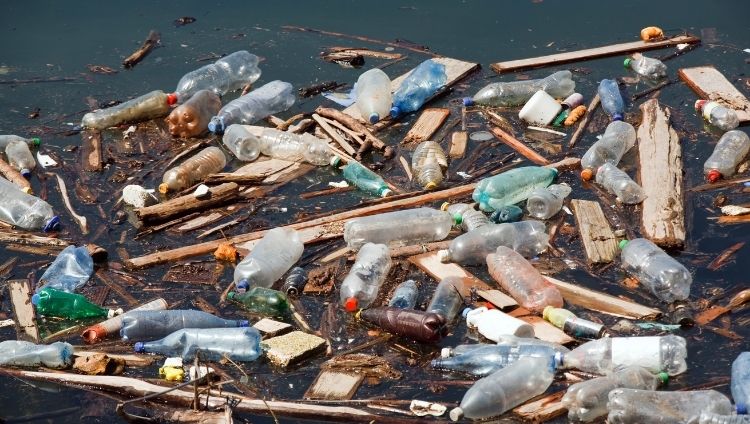Waste management is essential to maintaining a safe, healthy, and sustainable environment.
Uncontrolled dumping of waste adversely affects the land, sea, and air around us, from reduced biodiversity due to pollution, microplastics in water sources, and increased emissions of dangerous gases like carbon dioxide into the atmosphere.
To understand why it’s so important that we prioritize proper waste disposal practices both at home and at work.
Let’s take an insightful look at how improper wastage causes significant damage to our planet or how waste management affects the environment?
Land Pollution
Land pollution is often overlooked but poses a serious problem. The accumulation of waste can degrade soil quality and disrupt various terrestrial ecosystems.
Waste doesn’t just disappear; it breaks down and spreads, causing damage to both wildlife and humans. Imagine cherished outdoor spaces, such as parks or meadows, marred by waste contamination.
The consequences extend beyond environmental harm, putting the health and safety of nearby communities at risk. Thus, prioritizing land conservation is essential for the well-being of both people and the diverse species that share our world.

Water Pollution
People have been thoughtlessly tossing our trash into the oceans and other water sources, gradually turning them into a toxic mess that puts both sea creatures and people at risk.
With nothing to block their way, these harmful chemicals can easily spread and pollute large areas of freshwater, making it unsafe for those who rely on these water bodies for clean drinking water or enjoy activities like swimming.

Air Pollution
Air pollution is an increasingly pressing concern on a global scale, and understanding how mismanaged waste disposal contributes to this problem is essential.
Greenhouse gases surging into the atmosphere largely drive climate change – what may surprise some people, though, is that improper garbage disposal can contribute greatly to these emissions of harmful gases such as methane which plays a significant role in rising temperatures across the world.

Climate Change
Pollution is a leading factor in global climate change: from thickening the ozone layer to melting ice caps and rising sea levels.
Its effects have widespread consequences for humans, who face displacement from their homes, as well as for many species whose habitats are drastically altered by warming temperatures and rising waters.
Related Post: How Waste Management Contributes to Climate Change?
Lower Biodiversity
The loss of various species and crops poses a serious threat to Earth’s biodiversity, much like a puzzle missing critical pieces.
As species and crops vanish, the risk of disease outbreaks increases, potentially exacerbating challenges during major disasters. Furthermore, this loss reduces the environment’s capacity to adapt to changes.
Think of biodiversity as a strong team where each member plays a vital role; losing even a few members undermines the team’s strength. Therefore, protecting the planet’s biodiversity is essential for maintaining ecological balance and resilience.
Dead the Zones
Landfills are an all too common sight on the horizon, but their impact should not be overlooked.
As these spaces become increasingly filled with rubbish and waste, they cease to have any purpose other than serving as a dumping ground.
This creates a kind of wasteland that deprives many ecosystems of thriving in our landscape.
Plant Death
The impact of pollutants on our vegetation can be highly destructive. Contaminated soils pose as fatal threats to numerous plants, while even uncontaminated soil is not safe from harm – rainwater carrying toxic pollutants can also lead to their demise.

Animal and Marine Death
The harmful effects of reckless waste disposal might not always be immediately evident. Hazardous materials and waste contaminate the land, pollute the air, and infiltrate oceans, causing widespread environmental damage and endangering countless species worldwide.
Animals like fish, turtles, and many others face serious hardship as a result of our negligence. It is vital for society to acknowledge its role in this problem and take meaningful steps to reduce the harm before it worsens, protecting both the environment and its living creatures.

Frequently Asked Questions:
What are the 6 negative effects of improper waste management?
- Soil Contamination
- Water Contamination
- Extreme Weather Caused By Climate Change
- Air Contamination
- Harm Towards Animal and Marine Life
- Human Damage
What are the disadvantages of reducing waste?
With the increasing need to reduce solid waste, cities and professionals in the industry are looking for sustainable solutions.
Recycling is an attractive option; however, it can be expensive due to additional labor costs, transportation needs, and production expenses that must go into making recycled goods.
Ultimately this means consumers may have a bigger price tag attached when purchasing these types of products–but they make up for it with invaluable environmental benefits!
What is the main importance of waste management?
Effective waste management is essential for the preservation of our environment, health, and well-being.
Through its varied approaches like disposal or reuse/recycle – be it solid, liquid, gaseous, or hazardous substances such as paper, cans, and glass – businesses can not only help protect nature but also keep resources out of landfills while optimizing their efficient use.
What are the 5 effects of improper waste disposal?
- Land Pollution
- Water Pollution
- Air Pollution
- Climate Change
- Disease
- Plant Death
- Animal and Marine Death
- Loss of Habitats
Why is waste management a social issue?
Improper handling of waste can cause severe harm to biodiversity. This includes direct impacts like aquatic wildlife ingesting plastic microbeads, as well as indirect consequences such as landfill sites becoming major sources of greenhouse gas emissions and exacerbating climate change.
What are the four benefits of waste management?
- Saving money on what you buy
- Cutting your waste disposal costs
- Meeting your environmental obligations
- Finding new sources of revenue.


